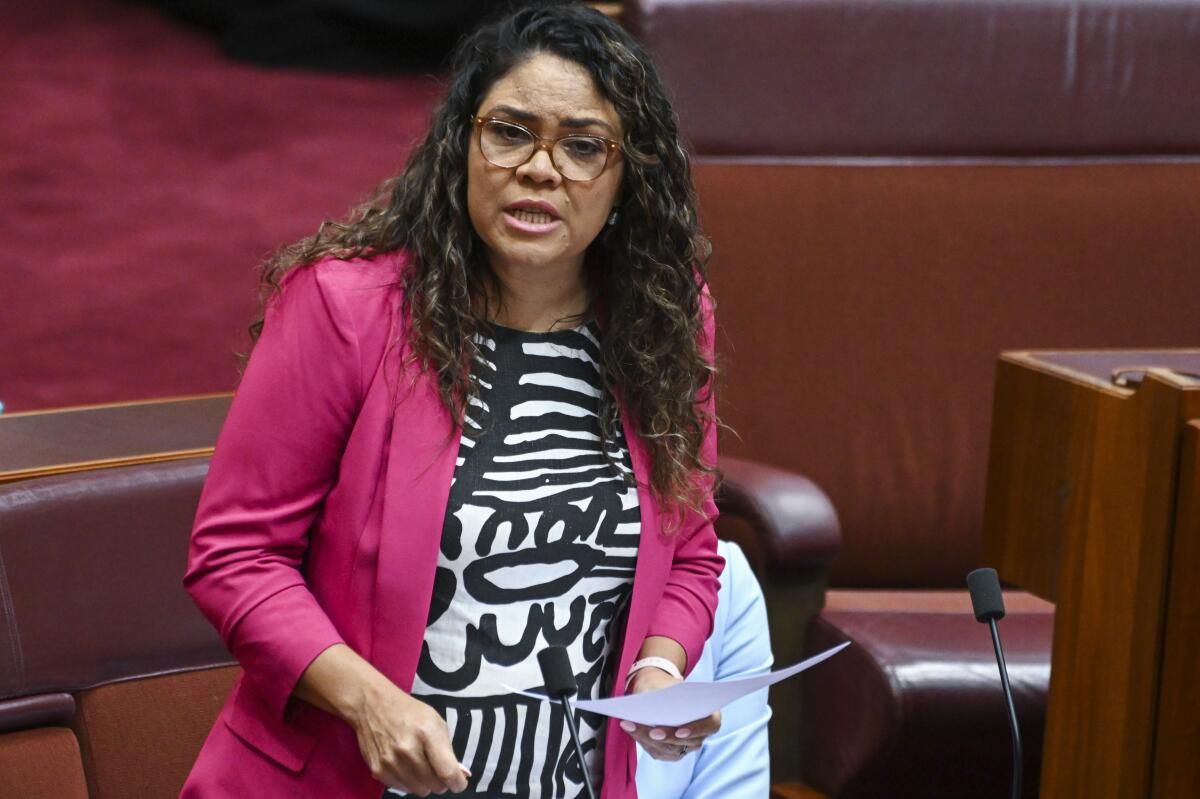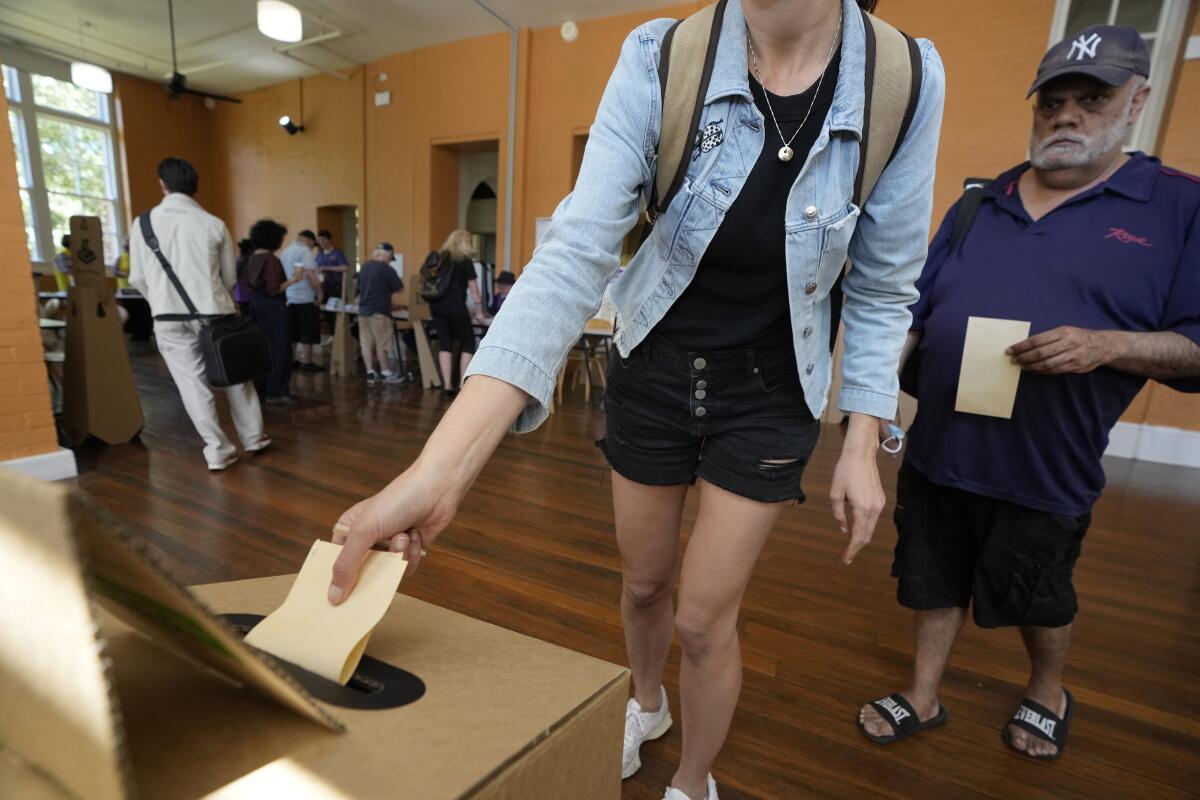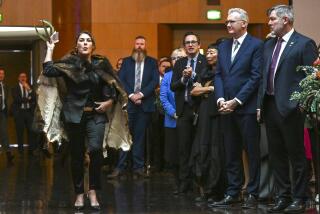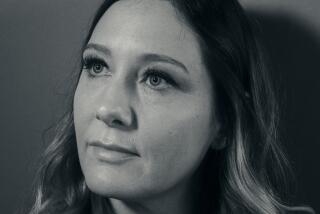Did she betray Indigenous Australians or protect them from victimization?

- Share via
MELBOURNE, Australia — Jacinta Nampijinpa Price was confident and composed when she appeared at Australia’s National Press Club to explain why she, a rising political star who is an Indigenous Australian, opposed a referendum to expand Indigenous rights.
“I think we need to move away from separatism,” she told the audience. That is “what has caused this condition, the racism of low expectations, that treats Indigenous Australians differently as opposed to maintaining standards for all Australians.”
When a journalist asked whether she believed colonization continued to have a negative impact on Australia’s Indigenous people, Price said no and listed the pluses of running water and readily available food.
The audience included her Warlpiri mother; her father, a white Australian of Anglo-Celtic heritage; and her husband, a Scottish- born musician.
Another journalist persisted: Didn’t she believe that Australia’s Indigenous people suffered from inter-generational trauma?
“Well, I guess that would mean that those of us whose ancestors [were] dispossessed of their country and brought here as convicts in chains are also suffering from inter-generational trauma,” she said, referring to her father’s heritage and Australia’s history of penal colonies. “So, I should be doubly suffering from inter-generational trauma.”
Her deadpan delivery at the September gathering sparked guffaws from the audience. Indigenous officials and representatives, on the other hand, called her rejection “a betrayal.” Noel Pearson, an Aboriginal lawyer and land rights activist and a prominent supporter of the referendum, says Price was caught up in a “redneck celebrity vortex.”
Australians were about to vote on changing the constitution to recognize Aboriginal people and establish an “Aboriginal and Torres Strait Islander Voice,” an advisory body that would provide nonbinding advice to Parliament. Political analysts said Price’s conviction that its passage would divide the country along racial lines and be a step backward for Indigenous Australians contributed to the referendum’s defeat earlier in the fall.
Her impact “was to simply remind a large group of Australians who were not engaged with the referendum campaign that not all Aboriginal people agreed with the proposed amendment,” said Kosmos Samaras, a director of RedBridge, a political consulting firm. The “yes” camp “failed to connect to outer suburban and regional or rural Australians.”
Price’s performance has prompted suggestions that one day she could be prime minister.

“Australians feel that Jacinta is speaking to them at their level, not in ‘political speak,’” said Michele Levine, chief executive of the market research firm Roy Morgan. “She speaks the truth plainly and logically and stands for the middle ground. Despite being from a major political party, many Australians see her as an anti-establishment, refreshingly honest figure who says what they are feeling.”
::
Today Australia prides itself as a progressive, multicultural society, but the image is at odds with the poor treatment of its Indigenous population, often described as the world’s oldest continuous culture.
European settlement, starting in 1788, had a devastating affect on the Indigenous people of Australia, leading to a legacy of disproportionately high rates of poverty, incarceration, suicide and low life expectancy. Abuse and mistreatment were commonplace; children were forcibly removed from their families as a policy.
The country’s “White Australia” policy to limit non-British migration to Australia was enshrined in law in 1901 and only finally abolished in 1973.
Indigenous Australians now number about 900,000 — 3.8% of Australia’s population — but they received the right to vote only in 1962. Unlike other British dominions, including Canada and New Zealand, Australia never forged a treaty with its original inhabitants. Attempts to improve infant mortality, life expectancy and employment have sagged despite government funding. Those failures were, in part, to have been addressed by the advisory board.
In 2022, when Prime Minister Anthony Albanese unveiled the referendum, polls suggested two-thirds would vote in favor. But Albanese, a member of the Labor Party, didn’t attempt to secure the support of the main opposition conservative party, the Liberals.
Peter Dutton, leader of the Liberals, said the party backed the constitutional recognition of Indigenous Australians but not the “Voice.” In April, Dutton named Price, a senator for less than a year, as the Liberal spokesperson for Indigenous affairs. In the next six months, she pressed home her message of all Australians belonging, whether “we’ve been here for 60,000 years or six months.”
When the counting was over on Oct. 15, more than 60% of Australians had voted no.
Weeks later, Price’s campaign comments continue to reverberate, prompting Indigenous journalist Stan Grant to say: “I give thanks for running water. That’s the measure of history, we have running water now. Thank you, colonization.”
Jon Altman, emeritus professor of economics and anthropology at the Australian National University said that, at times, Price “says things to provoke and overcorrect.”
“There have been some benefits of colonization, and many, many costs, and any serious cost-benefit analysis would show that the negatives outweigh the positives for many,” he said. “But like other conservative First Nations identifying people who can also emphasise their mixed ethnicity, she is just looking to break the doom-and-gloom-narrative and emphasize that there is plenty of Indigenous success like herself.”
::
Price, who describes herself as a “Warlpiri/Celtic Australian woman,” has been playing to an audience for years. At 26, she starred in one of the first television shows designed for Indigenous children, “Yamba’s Playtime.” The show was so popular it was adapted into a roadshow to press home health messages to children in the Northern Territory, where about 30% of the residents are Indigenous.
In 2015, she followed her mother, Bess Price, a teacher and former government minister for the Northern Territory government, into politics, becoming a councillor for the Alice Springs Town Council and, later, a deputy mayor. She won a Senate seat representing the Northern Territory in 2022.
Like her mother, she has been outspoken about the need to combat domestic and sexual violence in Indigenous communities. The Northern Territory has the highest rates of domestic violence in the country, and Indigenous women are 13 times more likely to die at the hands of a violent partner than non-Indigenous Australians.
“My vision, my hope, my goal, is that we can effect change that will see women, children and other victims in these communities become as safe as any of those living in Sydney, Melbourne or any other Australian city,” Price said in her maiden speech to Parliament.
She likes to trace her political legacy to Australia’s first Indigenous lawmaker, Neville Bonner, a member of the Liberal Party who became a senator in 1971. In the ‘70s, as the movement to give Aboriginal Australians land rights gained momentum, Bonner was ridiculed and derided as an “Uncle Tom” by some activists.
But Price says his philosophy of working within the system paved the way for the 11 lawmakers of Indigenous descent who are currently members of Parliament, which consists of 151 members of the House of Representatives and 76 senators.
The next countrywide election is scheduled for 2025. A Dec. 12 poll showed Price in second place among the most trusted politicians in Australia, behind Foreign Minister Penny Wong and in place of Albanese. And her emphasis on avoiding “low expectations” continues.
During her appearance at the press club, Price said, “If we keep telling Aboriginal people that they are victims, we are effectively removing their agency, and giving them the expectation [that] somebody else is responsible for their lives,” the 42-year-old lawmaker told the audience. “That is the worst possible thing you can do to any human being, ... tell them they’re a victim without agency.”
Petrakis is a special correspondent.
More to Read
Sign up for Essential California
The most important California stories and recommendations in your inbox every morning.
You may occasionally receive promotional content from the Los Angeles Times.










